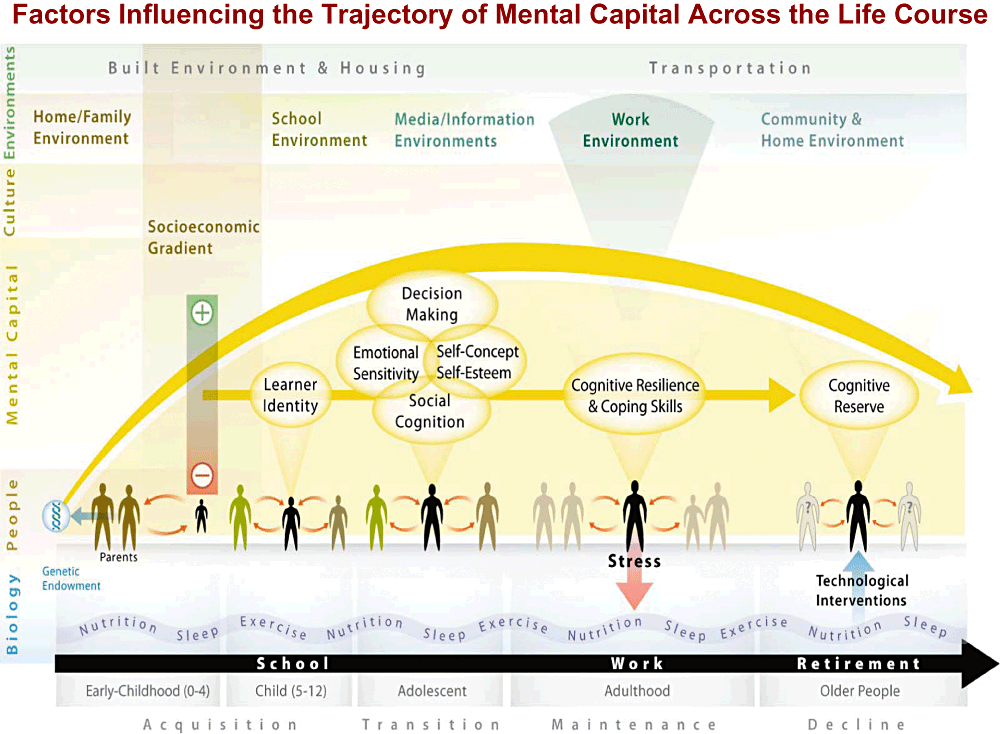John Buchanan and Jo-An Occhipinti

Mental wealth – the neglected force in national prosperity
As the immediate threat of the pandemic recedes, governments worldwide strive to restore ‘business as usual’.
We can do better than that.
Just as Adam Smith’s Wealth of Nations identified the determinants of material prosperity at the onset of the modern industrial era, now is our opportunity to clarify what constitutes a nation’s mental wealth. For Smith, the key determinants of prosperity included material factors like the division of labour, trading arrangements and a stable legal system.
Success in these domains is necessary to secure the pre-conditions for material prosperity. On their own, however, they are not sufficient to ensure wellbeing more broadly conceived.
The Mental Wealth Initiative at the University of Sydney aims to build mental health and wellbeing and foster healthier, more resilient societies that are capable of responding to future global challenges.
Our mission is to discover:
What arrangements – especially within communities, businesses, governments and the economy – deepen our mental wealth?
Mental wealth in action
Our response to the pandemic revealed the power of large-scale collective action.
The University of Sydney’s Brain and Mind Centre modelling suggested that Australia’s most successful mental health initiative in the first phase of the crisis was the Jobkeeper program.
This was not just about income support. At its heart was maintaining the large scale social connections that flow from employment relationships. Supporting this relationship was a powerful investment not only in individual job security – it kept the social fabric knitted together as people were not cast adrift and workplaces could hold tight until the physical danger passed.
Mental Wealth defined
The Mental Wealth research program builds on a number of analytical tributaries. One of the most significant is the ‘Mental Capital and Wellbeing Foresight Project’ (published 2008). This was a large scale study led by the UK’s Chief Scientist, Sir John Beddington. This integrated the insights of more than 450 researchers from a dozen-plus nations. Their quest was to discover ‘the factors that influence an individual’s mental development and wellbeing from conception until death.’
One of this project’s most critical findings was deceptively simple: national success will depend on developing mental not just material resources. In understanding the ‘mental’ dimension it is argued it is vital distinguish between two distinct but interrelated concepts: mental capital and mental wellbeing. Mental capital is the stock of our cognitive and emotional capabilities. Unlike physical capital, it is not necessarily depleted with use. Dynamics of mental wellbeing determine how mental capital is developed and deployed: sound mental wellbeing deepens mental capital, compromised mental wellbeing depletes it.
The Mental Wealth Initiative is advancing this foundational work.
So what are we talking about? Conceptually and metrically, mental wealth includes the economy as traditionally measured by GDP plus the value created by the dynamic relationship between mental capital and mental wellbeing that strengthens the fabric of society and underpins quality of life for all.
Mental wealth is:
a measure of national prosperity that captures the value generated by the deployment of collective mental assets and supporting social infrastructure and focuses on the contributions made by human beings to material and non-material standards of living – whether traded in markets/recognised in monetary terms or not.
If we are interested in deepening mental capital we must foster conditions of high collective mental wellbeing. On this analysis, mental wellbeing is not just important in its own right: it is just as critical for deepening mental capital as a factor of economic and community development.
Boosting mental wealth
The British researchers further explored how mental capital accumulates and atrophies over the life course. The following figure summarises their findings. It highlights the multiplicity of factors shaping the development of mental capital from conception to old age. While biological factors provide the foundations, social forces such as the socio-economic gradient, family, school, community and working life all have a role to play. Each in turn varies at different stages of the life course.
The UK researchers emphasised the individual conceived as experiencing commonly shared phases across a life span. However they stopped short in their analysis concerning the broader social settings shaping peoples’ “mental wellbeing”.
Despite its exceptional quality, the Foresight project did not receive the attention it deserved. The Global Financial Crisis (GFC) and subsequent austerity turn in public policy interrupted the further development of the agenda it proposed.
The next step
The University of Sydney’s Mental Wealth Initiative is building on this highly original work. We are especially interested in how social and contextual factors (things like social structures of support in local labour markets, networks of production and communities) can be strengthened to help with reconstructing collective mental wellbeing, and through that deepen our nation’s mental capital.
In this change from a deficit to an asset approach to mental health, we are calling for recognition of and investment in the things that advance our society collectively and will help communities flourish.
The projects aims are to challenge
- Current policy pre-occupation with maximising GDP growth and
- Not just pursuing a remedial approach to mental illness – it is time to also engage more deeply with the foundations of human development and human flourishing.
Strong partnerships have already been established with leading researchers internationally as well as with organisations like the World Economic Forum. We are seeking collaboration with other researchers, government agencies and civil society organisations such as unions and non-government social services. These partnerships will not only generate new knowledge of what develops and undermines mental wealth – they will experiment with new ways of working and conducting social life to lift the mental wealth of the nation.
The GFC disrupted the initial effort to elevate interest in mental capital and mental wellbeing. It is vital that history is not repeated. The University of Sydney initiative is being undertaken to help ensure a concern with mental wealth guides (and is not again sidelined) our trajectory out of a deep economic crisis and towards a new era of social and economic prosperity. Key matters of interest are creating quality sustainable work for all who want it, reconstructing structures of support that lift social and not just economic development and revitalising lifelong learning in workplaces and community setting, not just educational institutions.
Image: Nainoa Shizuru
John is the Co-Director of the Mental Wealth Initiative and a Professor in the Business Information Systems Discipline at the University of Sydney Business School. John is an expert in labour market structuring and its implications for skills and education. Current research interests include the future of expertise and social solidarity in a world of mass underemployment and AI.
Jo-An is Co-Director of the Mental Wealth Initiative and Head of Systems Modelling, Simulation & Data Science at the Brain and Mind Centre at the University of Sydney. She works with policy makers nationally and internationally to use these tools to understand the likely impacts of policy decisions before they are implemented in the real world.
Share
We believe in open and honest access to knowledge.
We use a Creative Commons Attribution NoDerivatives licence for our articles and podcasts, so you can republish them for free, online or in print.








